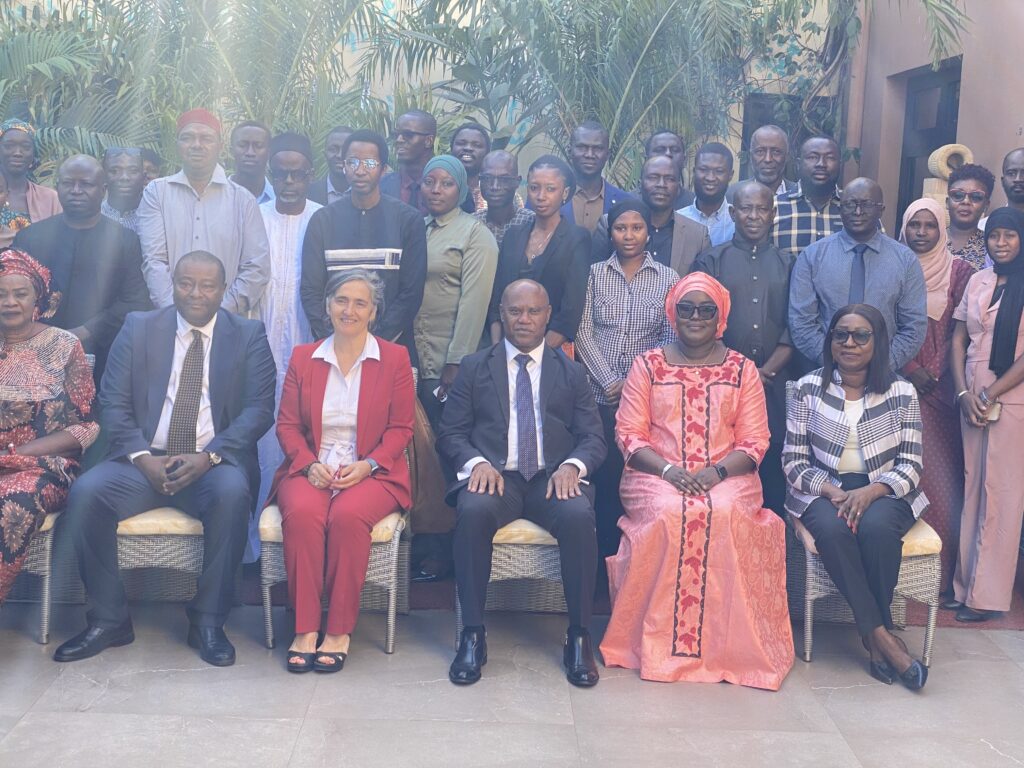
Group Photo of The Stakeholders During The Opening Ceremony Of Consultations On Business And Human Rights
By Ramtoulie Jawo
In a major step towards enhancing corporate accountability and promoting human rights in the business sector, The Gambia’s National Human Rights Commission (NHRC), with support from the International Institute for Democracy and Electoral Assistance (IDEA) and the European Union (EU), hosted a two-day public consultation forum on the United Nations Guiding Principles on Business and Human Rights (UNGPs) in Kotu, Gambia, on Wednesday.
The NHRC noted that the forum aimed to address key issues related to corporate responsibility, human rights, and sustainable development. By organizing these consultations, the NHRC reaffirmed its commitment to advocating for policies that ensure businesses operate ethically, while protecting the rights of individuals and communities.
The event brought together a diverse group of stakeholders, including senior NHRC officials, civil society representatives, members of the National Assembly, government officials, and business leaders.
Emmanuel Daniel Joof, Chairperson of the NHRC, highlighted the importance of the event, emphasizing the need for a unified and collaborative approach to foster development in The Gambia through responsible business practices and human rights protections.
He noted that while The Gambia’s business landscape, like much of Africa, has experienced significant growth—contributing to national economic development, job creation, and trade—there have been challenges. These include issues such as exploitative child labor, environmental degradation from sand mining and other extractive activities, and unfair labor practices in sectors like fishmeal production in coastal towns like Sanyang, Kartong, and Gunjur.
“However this progress has not come without challenges across the continent and within our borders we have witnessed incidents of exploitative child labour, environmental degradation due to sand mining and other extractive mining, the advent of fishmeal factories in our coastal towns of Sanyang, Kartong and Gunjur, unfair labour practices all resulting in conflicts between communities and businesses,” he said.
Joof emphasized that the forum’s objective was to initiate a national dialogue on the UNGPs and lay the groundwork for a national action plan that will guide efforts to ensure corporate accountability and the protection of human rights in business operations. He also called for greater awareness, understanding, and dialogue among stakeholders in the business sector to promote the adoption of such a national action plan.
The success of this initiative, Joof stressed, depends on the commitment and collaboration of all involved parties, encouraging participants to advocate for policies and practices that prioritize human dignity and well-being while fostering economic growth.
The UNGPs, according to the United Nations, are a set of guidelines for governments and companies to prevent, address, and remedy human rights abuses in business operations. The principles, proposed by the UN Special Representative on Business and Human Rights, John Ruggie, were endorsed by the UN Human Rights Council in June 2011. Alongside the resolution, the Council established the UN Working Group on Business & Human Rights.
Immaculada Roca i Cortés, the EU Ambassador to The Gambia, reaffirmed the EU’s commitment to supporting the Gambian government through technical assistance and capacity-building efforts. She described the consultations as a vital step toward embedding human rights within The Gambia’s business sector.
Speaking on behalf of the Minister of Justice, Solicitor General and Legal Secretary Hussein Thomasi emphasized the government’s responsibility to align national laws with international human rights standards. He reiterated the need for a business environment conducive to responsible investment, noting that adopting the UNGPs would offer the opportunity to strengthen legal and regulatory frameworks, including updating labor laws, environmental policies, and corporate governance standards.
“As a country that values Justice, equality and the dignity of all our citizens, we are committed to ensuring that the rights of Gambians are upheld. This aligns with our national development goals as set out in our vision 2020 and the national development plans which prioritizes good governance, the rule of law and inclusive growth, for purposes of business and investment opportunities as we work as a country to attract investors it is essential that we create a business environment that is conducive to responsible investment,” he said.
Thomasi also stressed that such efforts would create an investment climate that not only attracts foreign investors but also fosters domestic entrepreneurship and innovation.
Jainaba Faye, Head of International IDEA in The Gambia, underscored the importance of effective collaboration between the government and civil society organizations to ensure accountability for businesses’ human rights impacts. She noted that human rights are foundational to a just and equitable society, extending beyond government obligations to the private sector.
“As we all know, Human rights are the bedrock of a just and equitable society encompassing fundamental freedoms such as the right to life, liberty, security of person, freedom from slavery and torture and the right to work, to education and to participate in cultural life,” she said.
Faye added that research has shown that companies with robust human rights practices tend to be more resilient, enjoy higher employee satisfaction, attract socially conscious consumers, and face fewer legal disputes and reputational damages. She emphasized that respecting human rights is integral to long-term business success.
“Research has shown that companies with strong human rights practices are more resilient, enjoy better employee satisfaction and attract customers who are increasingly socially conscious. Furthermore, businesses that respect human rights are less likely to face costly legal battles, damage to their reputation or disruptions to their supply chains,” she said.
